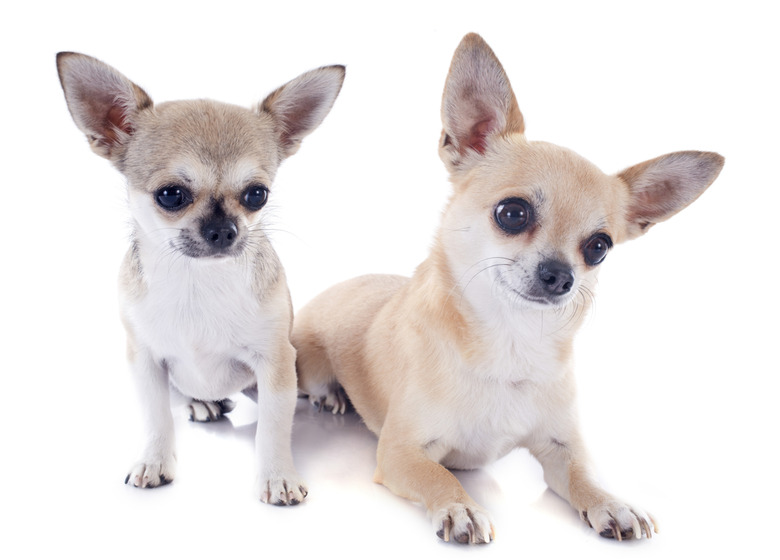Hair Loss In Chihuahuas
Chihuahua hair loss can result from issues common to all canines or certain predispositions of this diminutive breed. If your little Chi starts losing hair, visit your vet for an examination and diagnosis. Treatment depends on the cause of the alopecia, the formal name for hair loss.
Seasonal and environmental allergies in dogs
Seasonal and environmental allergies in dogs
It is frustrating to see your Chihuahua itching like crazy and you don't know why. Along with making dogs uncomfortable, itching can create openings in the skin that may become infected. Your vet can test for environmental allergens such as dust, mold, and pollen with a simple blood draw or skin test. The results can be complex to interpret, however, so your vet can explain what they mean and next steps.
Besides itching, dogs may also lick their paws, and if their ears are itchy, they often shake their heads. Pay attention to when symptoms occur, too, as allergies to the environment may worsen seasonally. For example, pollen typically causes allergy symptoms in the spring and summer, while mold may be the culprit when leaves fall. Dust mites may be irritating when dogs spend more time indoors in the winter. Treatment might include immunotherapy injections to help your Chi's body adapt to the allergen.
Food allergies are different in dogs
Food allergies are different in dogs
Food allergies are less common in dogs than environmental allergies, but some dogs are affected by them. Elimination diets are usually the best way to find out if a food is the problem. Dogs have different food allergy symptoms than humans, and even from other animal species like cats. For dogs with food allergies, about 75% are allergic to chicken, beef, dairy products, or wheat.
Your vet will explain what initial diet to feed, when to introduce a new food, what signs of allergy to look for, and how to record what you see. In addition, while people with a food allergy typically react rather quickly after eating it, dogs may take several days to react. It's important, therefore, to know what symptoms to look for and to be very specific in your notes. Diarrhea and vomiting can indicate a food allergy, but they could also indicate a food intolerance instead.
Fleas and other skin parasites
Fleas and other skin parasites
All animals can be expected to scratch if they have fleas — but if your Chi has a flea allergy, he's allergic to the flea's saliva, and the itching can be more intense. Your vet can recommend a topical or oral flea preventative to address the problem. Other parasites whose bites can cause hair loss include demodectic mange mites, which live in the hair follicles. Topical and newer oral flea preventives available from your vet can eradicate both fleas and this type of mange mite.
Fungi and infections can be misdiagnosed
Fungi and infections can be misdiagnosed
Ringworm, a fungal infection that's contagious to people and other pets, can cause redness, scaliness, and hair loss. While ringworm in humans usually causes circular lesions, it rarely makes circular patterns in dogs. Your vet may prescribe special shampoos for ringworm, along with antifungal oral medications; thoroughly disinfecting your dog's living environment is also important. Staphylococcus bacterial skin infections often do cause hair loss in a circular pattern, along with crusty lesions, and are often misdiagnosed as ringworm. Other secondary bacterial or fungal infections can also be introduced through skin lesions.
Metabolic and endocrine issues causing Chihuahua hair loss
Metabolic and endocrine issues causing Chihuahua hair loss
Metabolic issues such as hypothyroidism or Cushing's/hyperadrenocorticism disease can also cause hair loss in dogs. Certain endocrine or sex hormone tumors can also cause hair loss, although this is rare. When puppies shed their hair as their adult coat grows in, noticeable hair loss is normal, as is females losing hair when in heat and after giving birth. If these situations don't apply, your vet will consider metabolic or endocrine conditions when examining your Chi.
Color dilution alopecia in Chihuahuas
Color dilution alopecia in Chihuahuas
If your fawn or blue Chi starts losing hair, especially on the head and nape of the neck, it could be due to color dilution alopecia, a genetically inherited condition. The affected dog's hair starts falling out between the ages of 6 months and 3 years. There's no cure for this condition, but your vet can recommend shampoos, rinses, moisturizers, ointments, and even nutrition ideas to help manage it. Chihuahuas with color dilution alopecia should not be bred.
References
- Merck Manual Pet Health Edition: Allergies in Dogs
- VCA Animal Hospitals: Ringworm in Dogs
- VCA Animal Hospitals: Color Dilution Alopecia in Dogs
- Petchidog.com: Chihuahua Fur Issues
- Vetderm.ca: Northwest Veterinary Dermatology Services Ltd.: Food Trial Instructions for Dogs and Cats
- VCA Animal Hospitals: Demodectic Mange in Dogs
